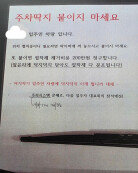Meat Soup Is Available at Neighboring Factories; Why Soy Bean Paste Soup for Us?
Meat Soup Is Available at Neighboring Factories; Why Soy Bean Paste Soup for Us?
Posted July. 15, 2005 03:02,
The neighboring factory served meat soup yesterday. Why do we keep having bean-paste soup?
There is tension these days over soup among the management of South Korean companies in the pilot Gaesong industrial complex.
Jo Dong-soo, president of Hosanace, a machinery facility company, said Boiled rice and side dishes are prepared by workers, but soup is provided by companies. We have to pay attention to what kind of soup is served by other factories, because North Korean workers are sensitive to equal treatment.
Among 15 companies that are going to move into the pilot industrial complex, three companies are recently building factories, breathing vitality into the industrial complex, and 3,800 North Koreans are working there.
Strong Points of North Korean Workforce: Diligence and Same Language Use-
According to a survey conducted by the economics department of Dong-A Ilbo on July 14 on representatives and executives of companies in the industrial complex, 14 out of 15 companies in the industrial complex cited the excellent quality of the labor force and low labor costs as the strong point of the industrial complex.
Most companies generally view North Korean workers are diligent and quick to adapt themselves to their work. Another strong point is that they have no trouble communicating.
At about 57.7 dollars (about 58,000 won) per person, the monthly pay of North Korean workers is more competitive than China and Southeast Asian countries.
Cultural differences between the two Koreas are showing up, however.
Jang Ho-seon, executive director of Romanson, a watch manufacturing company, said Whats interesting is that wall newspapers are the most effective tool to educate workers. He added that workers, who show little interest in audio-visual materials, avidly read wall newspapers containing key points of education.
A company called A recently had a small conflict with the representative of North Korean workers over the number of security guards. The owner of the company insisted on having one security guard, whereas the representative insisted on two security guards. The representative of the company said We realized belatedly that in North Korea more than two persons take charge of a task since keeping an eye on each other is an everyday affair in North Korea.
The most popular snacks among North Korean workers are Chocopies and carbonated drinks. However, they are not allowed to take the snacks with them to home after work due to regulations from North Korean authorities.
The weak points of the workforce are the procedure of entry into and departure from the North, and high construction costs.
Twelve companies, or 80 percent of companies in the industrial complex, pointed out that they have troubles with complicated customs procedures and emigration and immigration procedures.
In order to enter into and depart from the industrial complex, one has to apply for an invitation to North Korea at least four weeks prior to visiting and receive permission to visit the North from the Ministry of Unification. Three days before visiting North Korea, one has to report the visit to the North.
Kim Nong-seon, president of Yongin electronics, a manufacturing company of home appliance parts, said It is difficult to act quickly because it takes South Korean companies three days to decide the supply and demand of parts and one week to carry products out of the industrial complex.
Another burden on companies is the rise in the factory construction cost to more than two million won per pyeong because of the complicated customs procedure. The transport cost of construction materials increased to 600,000 won per 25-ton truck. And the prices of sand and gravel procured from North Korea are not that different from those of metropolitan areas in South Korea.
Among other difficulties include the shortage of infrastructure such as water and electricity, inconvenient communication infrastructure, and limits on taking in strategic materials.
Due to these difficulties, nine companies (60 percent) anticipated that full scale production at the Gaesong Industrial Complex will only be realized after 2010.
Kim Bong-joon, director of the Seoul office of the Gaesong Industrial District Management Committee, said, Since the two Koreas agreed to cooperate to improve passage procedures during the Inter-Korean Economic Cooperation Promotion Committee meeting that ended in July 12, these problems will be dealt with quickly.






![트럼프의 그린란드 병합 의지, ‘이 사람’이 불씨 지폈다[지금, 이 사람]](https://dimg.donga.com/c/138/175/90/1/wps/NEWS/IMAGE/2026/01/20/133193287.1.jpg)
